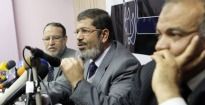Muslim B'Hood to Form Political Party
Egypt's military named an eight-person committee, including a member of the Muslim Brotherhood and a prominent Christian judge, to recommend changes to the country's constitution, as opposition parties showed the first signs of gearing up for elections.
The Muslim Brotherhood said it intended to register as a legal political party as soon as restrictions on establishing parties are lifted. The group was banned under President Hosni Mubarak's rule and ran candidates for parliament as independents.
Ayman Nour, head of the liberal Ghad Party, declared himself a candidate for president, the first person to do so. Mr. Nour challenged Mr. Mubarak in the 2005 presidential contest but soon after was convicted and jailed for four years on fraud charges that political opponents of the regime alleged were trumped up.
The Supreme Armed Forces Council, which consists of top military commanders and has ruled Egypt since Mr. Mubarak's resignation on Friday, has dissolved parliament and pledged to hold new parliamentary and presidential elections within six months.
Workers in some key sectors continued striking for better wages and working conditions Tuesday. Egypt's banks said they would remain closed through the end of the week because of strikes by employees, extending by two days a closure that had been due to end Tuesday.
Tuesday was a national holiday commemorating the birth of the Prophet Muhammad, and it was unclear if strikes would continue when employees are due to return to work Wednesday. The military has called on workers to return to work for the good of the economy.
The military council named a retired judge and prominent historian, Tareq al-Bishry, 77 years old, to head the constitutional committee. Mr. Bishry has written two seminal histories of modern Egypt, including one that focuses on relations between the country's Muslim majority and Coptic Christian minority. He was a judge on the State Council, which hears lawsuits brought by citizens against the government.
The committee has been given the task of rewriting six articles of the constitution, not redrafting the whole document as some opposition leaders had hoped.
The committee is expected to amend articles that cover presidential term limits and judicial oversight of elections, and to change other parts to curb the president's powers to amend the constitution and restrict civil liberties, including referring civilians to military tribunals.
The committee was expected to have its first working session on Wednesday morning at the Ministry of Defense. The military said it asked the committee to issue its recommended changes within 10 days.
Youth activists said the military told them the constitutional changes would be put to a popular referendum within two months, but the military has yet to confirm that.
Muslim Brotherhood officials said their party's membership won't be limited to Muslims, and that it would pursue an agenda focused on reforming the country's political, educational and social-welfare systems. "It will be a civil, not a religious party," said Abdel Moneim Abul Fatouh, a senior party official.
Mr. Fatouh reiterated a pledge made repeatedly by Brotherhood officials in recent days that the group wouldn't run a candidate for the presidency and wouldn't seek to win a majority in parliament. The Brotherhood appears to be working hard to reassure Egyptians who are wary that the group could use its organizational prowess to win an outsize share of power in elections.
Another sign of the dramatic changes afoot came on Tuesday with a state TV interview with Essam el-Eryan, a member of the Brotherhood's 12-member leadership body. Before Mr. Mubarak's ouster such an appearance would have been unthinkable.
Click here to read more.


